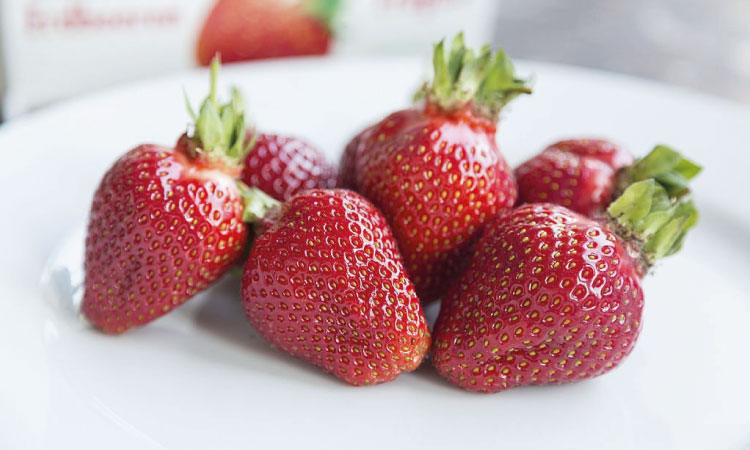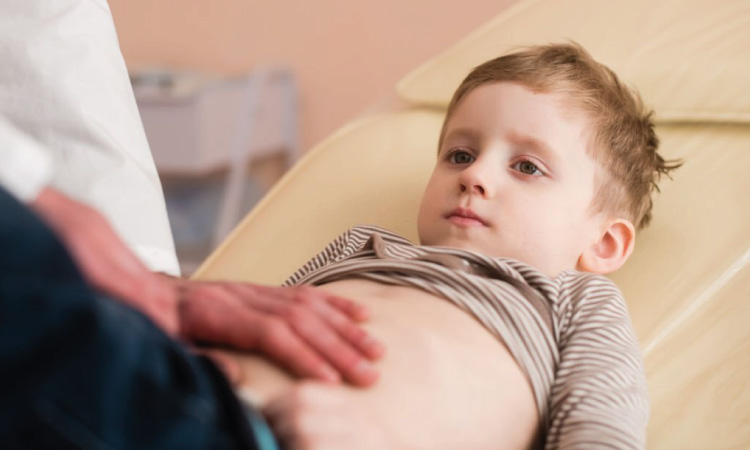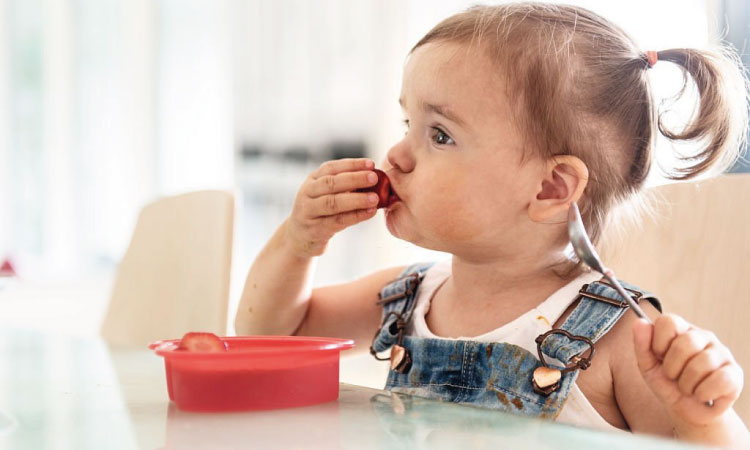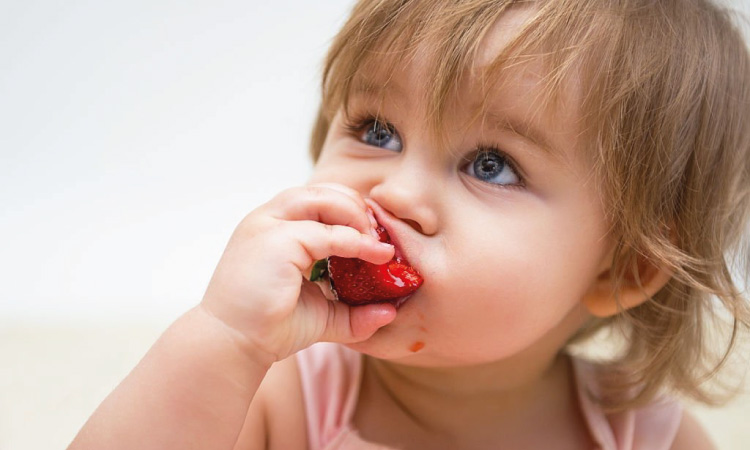In addition to being rich in vitamins and minerals, strawberries are also a good source of fiber and antioxidants. This fruit contributes to the overall nutrition, as well as the growth and development of the baby. They are the yummiest fruit and are loved by kids of all age groups. They are red in color and acidic in nature. Several considerations must be made before giving strawberries to babies. Babies can get allergies, and what you feed them can affect their chances of getting one. This is why it’s important to introduce new foods slowly and carefully. Therefore, parents need to know when the right time is for feeding strawberries to babies. You will find all of the information you require on this blog.
When Can Babies Eat Strawberries?
Babies start eating solids after the Annaprashan – first rice eating ceremony, mostly when they are six months and above. Strawberry is also a healthy option that can be given to babies when they start solids1. However, because of the increased risk of their child developing an allergy, many parents wait until their child is at least one year old before giving it to them. The key is to understand how to prepare strawberries for a 6-month-old.
Babies should be given smooth strawberry puree that has been strained to remove any lumps. Begin with a small serving of strawberries and increase the serving size as soon as the baby has gotten used to them and can digest them. Strawberry puree can be combined with a variety of other fruits and vegetables, including papaya, apple, banana, and watermelon to increase the taste and nutritional value2.
When strawberries are given to babies, there are chances that they can develop rashes which are due to the acidic nature of the fruit. This is also a reason why babies should not eat strawberries. This is a question that is in the minds of all parents. Rashes are commonly seen in babies with sensitive skin or the ones who have eczema. As parents, it is important to be vigilant and consult a doctor about the food allergies a baby has before introducing strawberries to the babies3.
Related Reading: 10 Best Baby Products For Your Baby’s Sensitive Skin
The Nutritional Value Of Strawberries
Strawberries for babies are a great choice for providing good nutrition. The table below depicts that not only are berries a great source of nutrition but are yummy as well. They are a powerhouse of nutrients and vitamins that make them a tasty as well as a healthy option. In case they do not cause allergy, they are a great choice for infants as it leads to healthy growth and development.
According to a source, every 100 gm of strawberries contain the below nutrients:
- Water – 91g
- Fiber -2g
- Calcium -16mg
- Iron -0.41mg
- Magnesium -13mg
- Phosphorus -24mg
- Potassium -153mg
- Vitamin C – 58.8mg
- Folate -24µg
Health Benefits Of Strawberries For Babies

Strawberries contains almost all essential nutrients needed by the kids and have many compounds and minerals that are good for babies. There are many benefits of strawberries for babies that help with their healthy growth and development of babies. Let us study a few of the benefits of strawberries for babies.
- It supports digestion: Strawberries are full of fiber that helps in smoothening digestion. It even helps to prevent constipation. It even has phosphorus that helps in boosting the digestion process, breaks down proteins, and even helps to repair the cells in the body4
- Keeps the baby well hydrated: As one of the most hydrating fruits that can be given to a baby, strawberries are an excellent choice. Infants are extremely sensitive to any changes in their environment and have a high risk of becoming dehydrated. but offering strawberries to the baby can help balance the water requirement and restore some vital minerals. One 18g of strawberry has 16.4 g of water content making it a hydrating option for babies5
- It helps in strengthening the immune system: The immune system of babies is immature, and they need healthy food to make the baby robust. Consumption of strawberries is an ideal source of phytochemicals, Vitamins, and other minerals that help in fighting infections and diseases. It even offers protection against eye ailments6
- It helps with the complete development: Strawberries have magnesium, potassium, folate, calcium, iron, and phosphorus that are vital for growth. Potassium and magnesium help in the electrolyte balance and folate present in strawberries helps with cellular growth
- Good source of calcium and phosphorus: Strawberries have calcium that is important for a baby’s healthy functioning of the heart, bone development, muscles, and nerve functioning
- Protects liver: Strawberries have antioxidants that protect the liver against any damage7
- Improve brain and nervous system: There are several phytochemicals in strawberries that aid in the development of your baby’s nervous system. As a result of its high folic acid and folate content, strawberries can improve cognitive function
- Great for the circulatory system: Folic acid, or folate, in strawberries plays a critical role in a child’s brain development. Furthermore, it is also essential for red blood cell production in the body. High potassium in strawberries helps develop new blood vessels and improve circulation
Related Reading: 12 Best Foods For Baby Brain Development
Precautions And Risks When Giving Strawberries To Babies
Strawberries are undoubtedly a great choice to be given to babies as it is full of nutrients. Yet there are few precautionary measures that one must keep in mind for ingesting the strawberries safely.
Some of the precautionary measures are given as under:
- If you’d rather have pureed strawberries than chunks, consider making your own. Remove the stems from eight to ten strawberries and wash them. Puree it until smooth in a high-powered blender or food processor
- It is advisable to feed the baby strawberries that are in a puree form with zero lumps. In case the baby shows any discomfort, feed at some gap or consult a child specialist
- It is good to buy organic strawberries from a store and not the open ones8
- Strawberries should be thoroughly washed or even soaked if you buy non-organic produce to minimize the risk of pesticide residues
- Before introducing any new food, a three-day rule should be used. Similarly, when the baby is being fed strawberries, it is best to wait for three days and not introduce any new food. This even helps in ruling out intolerance and sensitivity
- When introducing strawberries, always feed only one to two teaspoons in a mashed or pureed form. Once the baby develops a taste, one can slowly increase the portions. Very thin slices of strawberries can be given to a baby of nine months. It is important to avoid feeding the full strawberry as it can lead to choking
- It is recommended to feed juices to toddlers and babies after the consultation with the doctor as it can lead to excessive dental cavities and weight gain
Related Reading: 7 Common Foods That Cause Cavity In Toddlers
When it comes to giving strawberries to your baby for the first time, there are some risks to be aware of.
- Risk of pesticides: Strawberries grown using conventional methods may contain high levels of pesticides. This is something you can avoid by purchasing organic berries
- Risk of allergy: You should check with your child’s doctor before giving your baby this wonderful fruit if there is a history of asthma or allergies in your family
- Risk of choking: When it comes to strawberries, babies tend to gulp them down rather than chew them thoroughly because of their soft and slippery texture. This increases the chances of choking. As a result, before giving it to a toddler, it’s best to cut it up into smaller pieces
Signs Of Strawberry Allergy In Babies

Allergies in strawberries may be caused by a protein that gives them their red color. You should also keep an eye out for the following food allergy symptoms after giving strawberries to the baby:
- Pain in the abdomen, followed by nausea, vomiting, and diarrhea
- The baby’s face swells, especially around the eyes
- A general feeling of weakness in the infant, including dizziness and a lack of energy
- Hives that bring about small, itchy, red, or pink rashes on the skin
- Some babies may develop nappy/diaper rash as a result of eating strawberries because of the fruit’s acidity, rather than an allergic reaction
- Strawberries aggravate the symptoms of asthma and eczema in babies
Related Reading: 10 Common Reasons Your Baby Is Not Gaining Weight
Tips To Select And Store Strawberries
Strawberries are one fruit that does not ripen immediately after the harvest. It is thus important to focus on the ripeness of the fruit when you buy it.
Some tips that should be followed while selecting and storing strawberries are as below:
- Always pick up fully ripened strawberries since babies like fruits with a sweeter taste
- Don’t eat strawberries that have green or white spots. Look for ones that are bright red, shiny, and fresh. Avoid ones that are soft and have a deep red color because they have already ripened too much
- Never consume strawberries immediately after washing. Instead, pat them dry with a dry cloth
- Select strawberries that are soft but firm. Do not go for the strawberries with blemishes, holes, brown spots, etc
- Buy canned or frozen strawberries if the fresh produce is not available, but keep these points under consideration:
- Select the properly sealed cans, which have no dents or puffiness
- Always buy the canned strawberries as they are preserved in their juice and not any external syrup
- If keeping strawberries in a refrigerator, keep them in a paper or plastic bag without covering them for 24 hours. It can even be kept in a sealed bag inside a freezer for a few months
Ways Of Giving Strawberries To Babies
Babies are very delicate, so it is important to know the right process for feeding them strawberries. Given below are some of the ways of giving strawberries to babies.
- Look for indicators and readiness- First and foremost, it is important to look for the readiness of the baby, like showing an interest in food, weight gain, sitting with the help of support, chewing style, sitting erect with head control, etc
- Start with pureed form- Whenever a new food or fruit is given to the baby, it should be offered gradually and mostly in a mashed state, so that it is easy for the baby to digest it. Once the taste is developed, the portions can be changed
- Follow the three-day rule- This rule helps the parents to watch out in case of any allergy to the baby after consuming a particular food item. When introducing a new food item to your baby, wait three days before introducing another new food item. It’s best to give the same or previously introduced food items over the next few days, as well
- Bite-sized pieces- Toddlers are less likely to choke on strawberries if they are given smaller pieces
How Many Strawberries Does A Baby Have Every Day?

Consumption of the strawberries depends on the age of the baby. You can start with 1 to 2 teaspoons of strawberry puree for babies older than six months. However, strawberries should not be given alone but with other foods packed with nutrition.
Thus, strawberries are indeed fruits full of nutrition and are tasty as well. This fruit can be fed to the baby after he is six months old by mashing or in a pureed state. The babies get important nutrients and compounds from consuming strawberries. This in turn leads to the healthy development of the baby.
FAQs
Even though strawberries are not recommended for babies under one year of age due to the risk of food allergies, many Stage 2 foods do contain strawberries. During the processing of baby food, heat pasteurization will destroy the strawberry protein that causes allergies.
However, it’s possible that boiling the berries in your kitchen vessel won’t completely get rid of the allergens. Also, fresh strawberry puree retains more nutrients than jarred baby food, as the nutrients are depleted during the manufacturing process.
It is best to offer the babies mashed strawberries by stirring the same into a bowl of breakfast cereal or yogurt.
The strawberries can either be pureed or added to pudding or milk depending on the preference of the baby. One needs to work on the three-day rule which means if the baby is allergic, one should give a gap of three days before introducing a new item.
If the baby can grasp which is around 9 to 12 months, the baby can be given strawberries cut into four pieces vertically. If the size of the strawberry is too big then eight portions can be cut as well.

